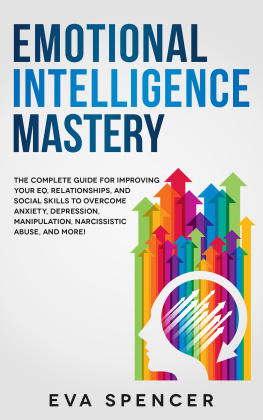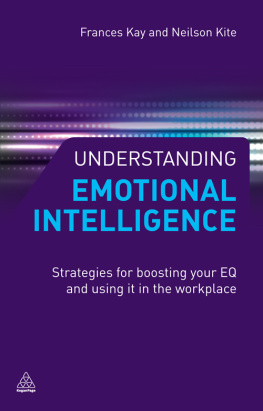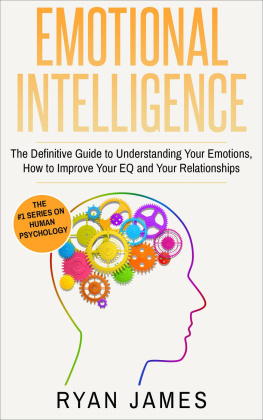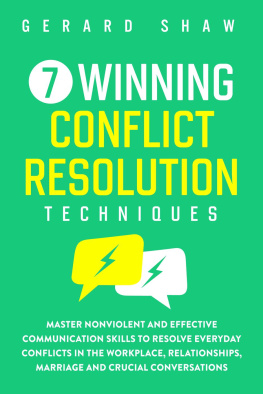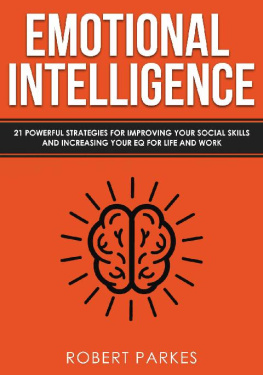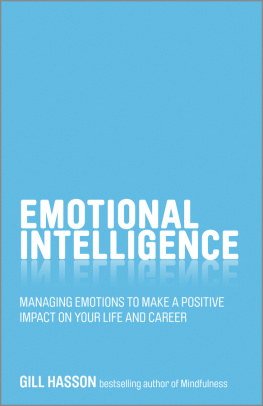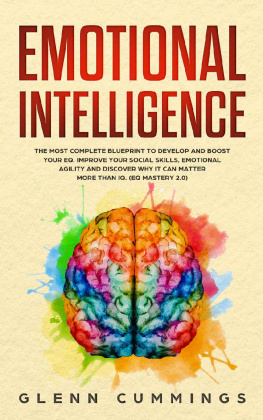EMOTIONAL INTELLIGENCE
How to Use Non-Violent Communication to Skyrocket Your EQ (For Stress Relief, Effective Communication, Empathy, Overcoming Challenges, and Conflict Resolution)
By
Avery Wright
Amazon Kindle Edition
EMOTIONAL INTELLIGENCE
Copyright 2018 - All rights reserved.
The content contained within this book may not be reproduced, duplicated or transmitted without direct written permission from the author or the publisher.
Under no circumstances will any blame or legal responsibility be held against the publisher, or author, for any damages, reparation, or monetary loss due to the information contained within this book. Either directly or indirectly.
Legal Notice:
This book is copyright protected. This book is only for personal use. You cannot amend, distribute, sell, use, quote or paraphrase any part, or the content within this book, without the consent of the author or publisher.
Disclaimer Notice:
Please note the information contained within this document is for educational and entertainment purposes only. All effort has been executed to present accurate, up to date, and reliable, complete information. No warranties of any kind are declared or implied. Readers acknowledge that the author is not engaging in the rendering of legal, financial, medical or professional advice. The content within this book has been derived from various sources. Please consult a licensed professional before attempting any techniques outlined in this book.
By reading this document, the reader agrees that under no circumstances is the author responsible for any losses, direct or indirect, which are incurred as a result of the use of information contained within this document, including, but not limited to, errors, omissions, or inaccuracies.
Table of Contents
Introduction:
Nonviolent Communication and Emotional Intelligence Come to the Rescue of Toxic Relationships
Do you think you are stuck in a toxic workplace filled with people of poor work ethics, poor communication styles, and poor management styles? What about other toxic effects of the workplace such as being laid off or fired? Are you reeling under the stress of workplace toxicity?
If you did quit from that place, you can still feel the negative impacts. Yes, it is possible that initially after quitting a job that you believed was bad, you felt a sense of relief. You think you are free from the negative impacts of toxic colleagues and bosses. Yet, after some time, negative emotions such as anger, hurt, resentment, and fear of uncertainty about another job are sure to come back.
Why do people get so frustrated at jobs? The reasons could be many including bad bosses, poorly performing co-workers, ineffective managers, and more. When co-workers dont do their jobs well, you end up sharing their workload over and above your own work. Ideally, such situations are to be managed and avoided by managers in the office, right?
However, in a real-world scenario, you will find ineffective managers who dont do what they are supposed to do, and you end up having to take on the workload of poor and below-average performers. Moreover, the internal politics between co-workers and managers in any workplace also tend to play a big role in increasing the toxicity of the situation.
For example, a co-worker could be great friends with the manager who is biased towards this person and because of which he or she is let off lightly while you get loaded with that persons work too. If you tried to complain, you could get into trouble for complaining as well.
Then, there are outsourcing measures adopted by companies resulting in loss of jobs. How do these companies manage such situations? While some do agree on providing severance packages to their employees, most others use unpleasant methods. Typically, people who need to be benched are given poor performance appraisal reviews hoping they resign on their own. People do end up quitting, some in tears and some with deep feelings of resentment and anger against their employers.
Also, isnt it true that some managers choose to put down their team members for their lack of team spirit because they do not attend social get-togethers? Now, there is no mandated job description that attendance at office parties is a must. And yet, some managers use this unfair weapon on many a hapless victim.
Such toxic situations in the workplace do sound familiar, right? How does one get out of such environments? Generally, you have the following options:
- Try and change the situation.
- Try and put up with what is happening.
- Move away from that place.
You are free to choose any of the above options depending on the situation and your specific need. However, no matter which route you take, you have to start the process of changing from within yourself and your internal communication methods. And that is what emotional intelligence is all about. Emotional intelligence is the ability to identify, understand, use, and manage emotions and feelings in ways that create positive outcomes for you and those around you. Managing emotions effectively includes positive results in the following:
- Stress release
- Effective communication
- Empathy with others
- Overcome challenges
- Conflict resolution
Emotional intelligence can be developed by working on some key abilities that help us manage our emotions which in turn help us manage toxic situations. Some of these abilities connected to emotional intelligence include:
- To effectively and quickly reduce stress for yourself at any given moment whether at home or the workplace.
- To identify and recognize your emotions, and managing them in ways such that they dont overwhelm you.
- To connect emotionally with other people using nonviolent communication including the right of choice of words and nonverbal communication cues.
- To use humor in any given stressful and difficult situation to diffuse stress and conflict positively and effectively.
Understanding, managing, and implementing emotional intelligence can be done through the process of nonviolent communication as proposed by Marshall B. Rosenberg, the founder of Center for Nonviolent Communication who believed that if we can use communication combined with compassionate give and take, then it is possible to replace grief, toxicity, and violence in our world with happiness, joy, and peace.
When you are in the midst of a toxic environment, and if you could step back from the stressful situation, and observe the surroundings and yourself, you will notice that there is a brutal and harsh tone in your self-talk. You are filled with self-recriminations along with a lot of negative emotions towards other people who you believe are responsible for your situation.
In such difficult situations, the blame-game is the first thing on the minds of most people. Instead of finding solutions to handle the toxicity at that moment, we begin to indulge in the conversations like:
- I should have done this instead of that.
- He or she could have easily helped me instead of ignoring me.
- I would have done that if only I had known this would be the outcome.
If we get stuck in these kinds of limiting self-talk, we will never find the courage and will to move beyond toxicity. Using emotional intelligence via the compassionate path of nonviolent communication will help you move forward.
Toxicity is not just limited to the workplace. Even in personal relationships, we are stressed out by problems created due to misunderstandings leading to the breakdown in compassionate communication between partners, family members, and friends. Here too, we are so overcome and overwhelmed by agonizing negative emotions that we wittingly or unwittingly indulge in non-compassionate communication resulting in increasing the pain in the situation instead of solving the problem.


